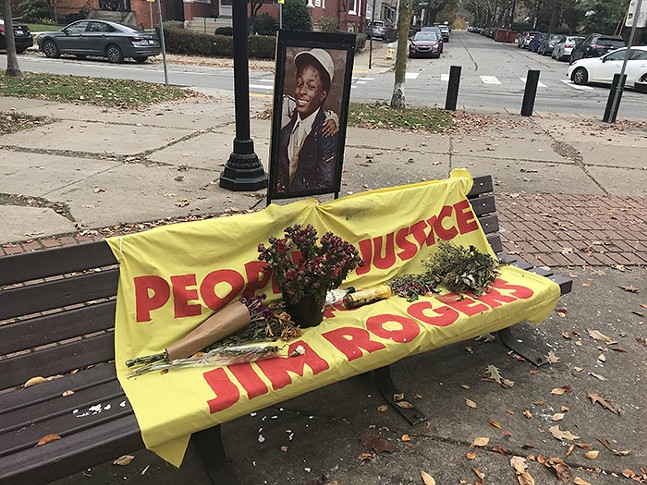In October, Jim Rogers was tased by Pittsburgh Police eight times after authorities were called to respond to Rogers allegedly stealing, then returning, a bike from a neighbor’s front yard in Bloomfield. He was transported to a hospital, but “exhibited a medical emergency” outside the hospital, and then died the next day.
Some neighbors told WPXI that police officers used excessive force on Rogers, a man experiencing homelessness, during the encounter and asked them to stop.
On Dec. 21, the Pittsburgh Department of Public Safety announced discipline against several officers involved in the incident. According to a press release, eight Pittsburgh Bureau of Police officers, including two supervisors, “will face varying levels of discipline in accordance with the Fraternal Order of Police collective bargaining agreement.”
The department didn’t release any more specifics of the level of discipline and said it is ”not permitted to discuss details of the disciplinary process.”
According to a release, Pittsburgh Police Chief Scott Schubert said, in responding to the Rogers incident, that the police department “failed our fellow citizen.”
The announced disciplinary measures come just minutes after a story in TribLive reported that Rogers reportedly asked for help and medical attention at least 13 times as he was sitting in the back of a Pittsburgh Police vehicle after he was tased on Oct. 13.
According to an executive summary of an internal investigation obtained by TribLive, Rogers banged his head on the seat for 17 minutes and exclaimed repeatedly, “I need a hospital, I can’t breathe, get a medic, help me.” The report says that two Pittsburgh emergency medical technicians at the scene never tended to Rogers during these 17 minutes, despite his pleas and officers on the scene acknowledging that Rogers needed help. During that time, EMTs instead decontaminated police officers that had gotten Rogers’ blood on them.
“The [Pittsburgh Police Critical Incident Review Board] has determined that this critical incident resulted from a series of compounding performance failures by [Pittsburgh Police] Personal,” read the report obtained by TribLive.
According to the report, Pittsburgh Police officers involved included: Officer Keith Edmonds, who first responded to Rogers and tased him twice; Lt. Matthew Gauntner, who failed to ask questions about how the taser was used and how Rogers' blood got on Edmonds, and failed to assign someone to monitor Rogers; Sgt. Colby Neidig and Sgt. Carol Ehlinger, who the report said "acted more like bystanders than supervisors"; Officer Neyib Velazquez, who didn't tell anyone that Rogers said he needed medical attention; Officers Gregory Boss and Patrick Desaro, who transported Rogers and claimed they didn't believe he was in medical distress, despite video showing Rogers breathing heavily and having difficulty stringing words together; and Officers Jeffery Dean and Paul Froehlich.
Gauntner retired earlier this month.
An autopsy report has not been released for Rogers’ death. Allegheny County District Attorney Stephen Zappala hasn’t announced any decisions on whether charges should be filed against officers involved, and said last week that he is waiting on the medical examiner to release a cause of death. Zappala called Rogers' death "unnecessary and absolutely preventable," according to WTAE.
Pittsburgh Mayor Bill Peduto called the incident a failure of the system.
“It is an absolute tragedy that Jim Rogers lost his life while in Pittsburgh Police custody — a failure of a system that should have protected his life," said Peduto in a statement. "This critical incident included multiple failures. Today’s announcement around pending disciplinary action and policy changes is a starting point. We must continue to make reforms in policing and within society to do what we can to make sure this never happens again and that Mr. Rogers’ family receives the justice they deserve.”
According to the city press release, all sworn Pittsburgh Police officers are now required to complete a taser refresher course, followed by an exam, and to become fully certified Emergency Medical Responders. These rules were instituted following Rogers' death.
The Pittsburgh Police said it would like to “express its most sincere condolences to the family and friends of Mr. Jim Rogers” and thanked the family for “patience in affording the CIRB the time and latitude to investigate the events that led up to his tragic death.”
Pittsburgh Police Chief Scott Schubert said that officers didn't live up to the highest standards of care when responding to Rogers.
“Jim Rogers will serve as a sober reminder of the tremendous responsibility all officers bear when they wear the Pittsburgh Bureau of Police badge,” said Schubert. “Every resident and visitor to the City of Pittsburgh is owed the highest standard of care when they are in the custody of Pittsburgh Police. In the case of Jim Rogers, we failed our fellow citizen. The disciplinary measures and procedural changes we are announcing today are intended to ensure a tragedy such as this never occurs again in the city of Pittsburgh.”
Rogers’ death had led to several protests and vigils across the city. During one of those protests, Rogers' family demanded police release the names of all the responding officers who participated in his arrest, the names of any medics who responded to the call, and a full release of all unedited body camera footage from Pittsburgh police. The names were made public thanks to TribLive's reporting, but the police did not release them, nor has body camera footage been made public.
The Pittsburgh branch of the NAACP also criticized the level of transparency during the investigation, which is being undertaken by Allegheny County Police, as is customary in Pittsburgh Police misconduct investigations.


